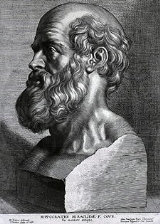
: ; Hippokrátēs; ca. 460 BC – ca. 370 BC) was an ancient Greek
physician
of the Age of Pericles
(Classical Athens), and is considered one of the most outstanding figures in the history of medicine
. He is referred to as the father of Western medicine in recognition of his lasting contributions to the field as the founder of the Hippocratic School of medicine. This intellectual school revolutionized medicine in ancient Greece
, establishing it as a discipline distinct from other fields that it had traditionally been associated with (notably theurgy
and philosophy
), thus establishing medicine as a profession.
However, the achievements of the writers of the Corpus
, the practitioners of Hippocratic medicine, and the actions of Hippocrates himself are often commingled; thus very little is known about what Hippocrates actually thought, wrote, and did.
Time is that wherein there is opportunity, and opportunity is that wherein there is no great time. Healing is a matter of time, but it is sometimes also a matter of opportunity. However, knowing this, one must attend to medical practice not primarily to plausible theories, but to experience combined with reason. For a theory is a composite memory of things apprehended with sense perception. ![]()
Conclusions which are merely verbal cannot bear fruit, only those do which are based on demonstrated fact. For affirmation and talk are deceptive and treacherous. Wherefore one must hold fast to facts in generalizations also, and occupy oneself with facts persistently, if one is to acquire that ready and infallible habit which we call "the art of medicine."![]()
Everything in excess is opposed to nature.![]()
To do nothing is sometimes a good remedy.![]()
Sleep and watchfulness, both of them, when immoderate, constitute disease.![]()

